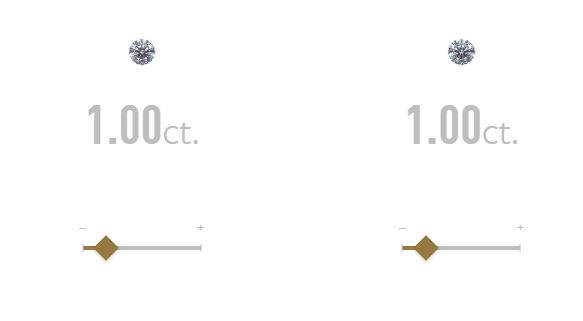
A pair of diamond earrings are a classic gift to mark a special occasion.
Jewelry is one of the most popular gifts we use to mark the momentous occasions in our lives. It is an outward expression of what we mean to one another. Holidays, birthdays and anniversaries and other achievements are just some of the events we celebrate with special gifts of jewelry, and diamonds are among the most favorite to give.
The budget for your gift is likely one of your most important parameters, but you can make sure you receive the most value for your purchase by learning more about diamonds before you shop. These six tips will help you find your ideal gift.
LEARN ABOUT THE 4CS
The 4Cs of diamond quality is a language jewelers everywhere use to describe the attributes of a diamond, that when taken together, help to determine its overall quality. Quality is ultimately tied to price, so it’s crucial that you learn the 4Cs so that you understand what you’re buying:
Carat

Diamond images are for reference only and may vary based on screen size.
Clarity
Diamonds are created by nature under tremendous heat and pressure. Nearly all diamonds contain unique internal characteristics called inclusions and external characteristics called blemishes. Many clarity characteristics are too tiny to be seen by anyone other than a trained gemologist using magnification. The GIA Clarity Scale contains 11 grades ranging from Flawless to Included.

Color
Truly colorless diamonds are very rare and highly valued. The GIA Color Scale uses letters to represent the absence of color, beginning with D (colorless) and ending at Z (light yellow or brown). Color distinctions can be quite subtle and only visible to the trained eye, but the differences can have a significant impact on price.

Cut
While diamonds can be fashioned into different shapes, the term “cut” refers to how a diamond’s complex proportions and angles relate to light. A number of factors influence a diamond’s cut grade, including its overall face-up appearance, design and craftsmanship. The GIA Cut Scale for standard round brilliant cut diamonds ranges from Excellent to Poor.

CHOOSE A TRAINED JEWELER
Select a jeweler as carefully as you do a doctor, lawyer or any other trained professional. Find someone who is credentialed, such as a GIA Graduate Gemologist. Take note of their affiliations with jewelry industry groups and professional associations. Use GIA’s Retailer Lookup to find a jeweler near you who carries GIA-graded diamonds or has GIA-trained associates on staff.
ASK FOR AN INDEPENDENT DIAMOND GRADING REPORT
A diamond grading report is an unbiased assessment of the diamond’s quality. It provides a description of the diamond’s 4Cs and confirms that the stone is a natural or synthetic diamond. The report also discloses any treatments the diamond may have undergone to alter its color or clarity. You can verify the information contained in any GIA report by entering the report number in Report Check, GIA’s secure online database.

GIA diamond grading reports, like this Diamond Dossier®, provide a full assessment of a diamond’s quality using the 4Cs. View a sample Diamond Dossier.
KEEP YOUR PURCHASE SECURE
A laser inscription will help identify your diamond if it’s ever lost or stolen. You can request to have the diamond’s report number or a personal message inscribed on the girdle (the diamond’s perimeter). The inscription is viewable using a jeweler’s loupe or microscope under 10X magnification. Diamonds that come with GIA Diamond Dossier® reports contain the diamond’s report number laser inscribed on the girdle.
You should also have the diamond appraised and insured. A diamond grading report is the independent assessment of quality, while an appraisal gives a monetary value. If you’re looking for a qualified appraiser, you might start by contacting an appraisal organization for a referral.

Microscopically inscribing the report number on the diamond’s girdle makes it possible for you to easily identify your diamond in case it is ever lost or stolen.
CONSIDER PURCHASING THE DIAMOND LOOSE AND HAVING IT SET IN THE RING LATER
Are you shopping for an engagement ring, but not sure what your future fiancée prefers in a ring? Consider purchasing a loose diamond and then decide on the mounting together. Make sure to have the loose stone graded before having it mounted. Read more engagement ring buying tips.
A FINAL TIP BEFORE YOU HEAD FOR THE JEWELRY STORES
Be sure to download GIA’s free 4Cs app for a convenient way to have more diamond knowledge at your fingertips, including access to GIA’s Retailer Lookup and Report Check services. Available in English and Simplified Chinese, you can find GIA’s 4Cs app on iTunes for iPad (English) (Chinese) or iPhone (English) (Chinese) and on Google Play (English) (Chinese).




